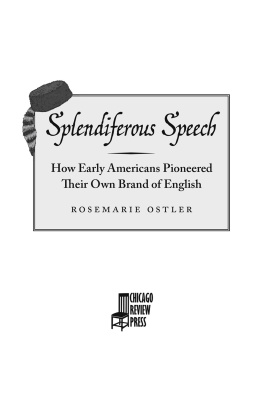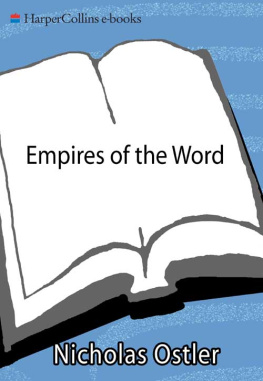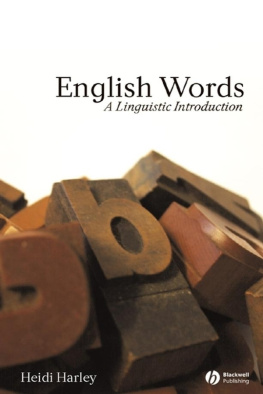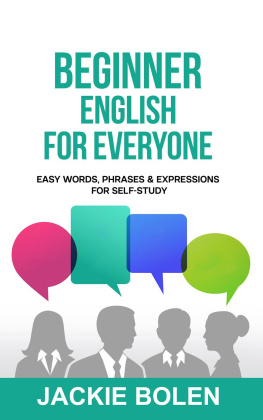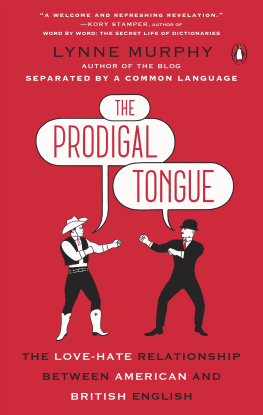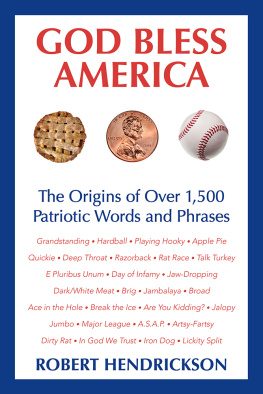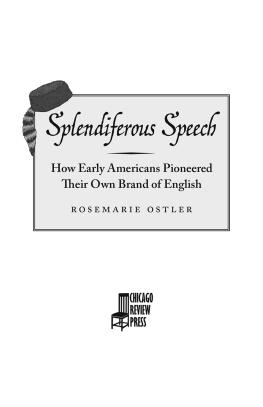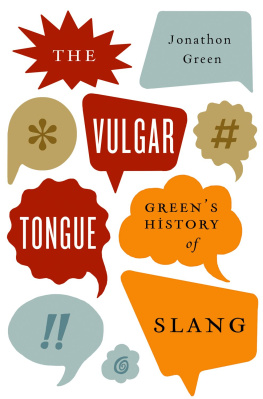Prologue
American Talk
WHAT DOES IT mean to talk like an American? To John Russell Bartlett, who wrote an 1848 dictionary celebrating colloquial American speech, it meant being partial to outlandish slangsplendiferous, scrumptious, higgledy-piggledyand newly created verbsadvocate, eventuate, demoralize. It also meant borrowing new words as neededraccoon, tomahawk, tobaccoand repurposing old onesfall to refer to autumn, mad to mean angry, corn for a native grain.
Bartletts Dictionary of Americanisms: A Glossary of Words and Phrases Usually Regarded as Peculiar to the United States also revealed some typical ways that Americans use language. For instance, they create vivid expressions out of everyday life. Real-world metaphors in Bartlett include save someones bacon, pull up stakes, fizzle out, cave in, sit on the fence, play possum. Tall talk and hyperbole are also part of the mix. The picturesque boaster who claims to be half horse, half alligator, and a touch of the airthquake is a quintessentially American language user. So is the comic rural figure who confesses that hes been knocked into a cocked hat and no two ways about it.
Bartlett (no relation to the quotations Bartlett) was not the first to record popular Americanisms, but most earlier writers only talked about them to criticize. John Pickering, who authored an 1816 collection of American words and phrases, apologized to his readers for publishing many questionable terms. He explains in his introduction that his main purpose is not to give these terms status but to show those who would speak correct English what they should avoid.
Bartletts purpose was the opposite. He wanted to showcase the linguistic traits that make American English unique, even if they dont exactly add up to proper speech. The Dictionary of Americanisms represents a turning point for the American language. For the first time, slang and popular expressions appeared in print without apology.
Bartlett was a businessman and independent scholar who became fascinated by the American way with words. An avid information gatherer and list maker, he decided to collect as much slang and folk speech as he could find. It turned out to be a lot. In ten years of combing novels, newspapers, speeches, and sermons, he found hundreds of examples reaching back to the earliest settlement days.
He discovered that certain aspects of American life were especially rich sources of vocabulary. The western frontier provided a continuous stream of new speech, starting with the 1803 expedition of Meriwether Lewis and William Clark. Like earlier colonists, Lewis and Clark helped themselves to Native American wordscalumet, sassafras. They also combined existing English words in new waysturkey buzzard, sweat house, mule deer. Later settlers continued the trend. The famous frontiersman Davy Crockett contributed more than a dozen memorable words and phrases, including chip off the old block, a power of good, bark up the wrong tree, go the whole hog, and be stumped.
The political world has always been a bubbling stew of slang and sensational rhetoric. Bartlett recorded words that entered the language or changed their meaning as Americans created a new governmentCongress, presidential, senatorial, legislate. He also noted colorful terms like gerrymanderprobably the first piece of American political slangplus caucus, lobby, stump speech, spoils, and others. When Bartlett was writing his book, the intractable conflicts that led to the Civil War were just heating up. He captured the mood of the moment by including descriptive party nicknames like Barnburners, Old Hunkers, and Locofocos.
Newspapers were another excellent resource for slang
Although most of Bartletts dictionary entries are familiar to modern Americans, not everything made it into the permanent vocabulary. Many one-of-a-kind words and expressions like absquatulate (leave in a hurry), lickspittle (a groveler), blatherskite (a noisy, blustering person), and know b from a bulls foot (know whats what) are now sadly obsolete. They nonetheless display the hallmarks of typically American slangwordplay, homespun metaphors, unexpected compounds. Words come and go, but what makes English American hasnt changed all that much since Bartletts day.
Besides its unabashed embrace of the countrys low language, Bartletts dictionary was remarkable for another reason. It was the first book of its kind that was favorably received by most critics. Although one or two reviewers complained about the preponderance of mere slang described it as replete with amusement as well as instruction. Littells Living Age predicted that it would provide a fund of fun for a winters evening. When the fourth edition appeared in 1877, the Providence Evening Press called the book a landmark in the literary history of the country.
This positive attitude was a sharp departure from earlier opinions on the value of American English. The British had been disapproving of the American dialect since the seventeenth century. Early British commenters joked uneasily about the infiltration of Indian words like wampum or disdainfully noted the use of fall to mean fall of the leaf rather than the biblical fall of Adam. (Notes on the State of Virginia) that included the word belittle.
Many early Americans also worried about keeping the language pure. John Adams, among others, thought the government should establish an institution for refining, correcting, improving, and ascertaining the English language in America. Although Americans who wrote about the topic defended their speech against the most abusive British attacks, they still talked about purging the language of vulgarities and improprieties. If innovations were accepted into American speech, warned one critic, the country would suffer the embarrassment of being placed among those who use dialects rather than standard English.
A likely reason why Bartletts book escaped this sort of criticism is that it appeared at an auspicious moment. The year of its publication, 1848, found Americans in an unusually nationalistic mood. The Mexican-American War had recently ended with the Treaty of Guadalupe Hidalgo, which gave the United States over half a million square miles of new western territory, including California, where gold had just been discovered. That same year Zachary Taylor was elected president in the first national election to be held on the same daythe Tuesday after the first Monday in Novemberin all thirty states.
Americans were starting to see themselves as the political and cultural equals of the English speakers on the other side of the Atlantic. Along with that new self-confidence came a new appreciation of their own vernacular. Bartletts dictionary made it clear that in the seventy-two years since the American Revolution, American English had decisively declared its own form of independence. Although built on a British foundation, it had developed a style and flair all its own. The story of Bartletts

